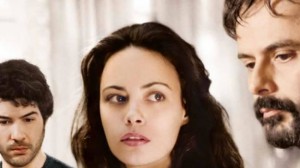 �I didn�t want to portray Paris as tourists saw it,� says Asghar Farhadi. �So we found a house just outside of�Paris to situate this film.�
�I didn�t want to portray Paris as tourists saw it,� says Asghar Farhadi. �So we found a house just outside of�Paris to situate this film.�The Past�is the first film the Iranian director has made outside his homeland. The decision to film in France comes after the phenomenal success of�A Separation, which won the Golden Bear at the 2011 Berlin Film Festival and the Oscar for Best Foreign Language Film last year. Speaking to�The National�at Cannes, Farhadi says he had (not very good) offers from the US and that he wanted to test his directing by making a film elsewhere. He spent two years making the film in France and now says he will return to Iran.
One of the great difficulties was the language barrier. There was a translator on set throughout, as the director spoke in Farsi to French actors. B�r�nice Bejo, best known for her role in�The Artist, explains: �It�s quite amazing to watch someone speak and then have someone else speak in his place. We listened very carefully to everything that was said.�
It turns out that you can take the filmmaker out of Iran, but you can�t take Iran out of the filmmaker. The director says: �Well, I am, of course, Iranian. So I can work for years outside Iran but I still remain a very Iranian director. I trained as a director in Iran and I know I should always continue to work in the same way. Whether I�m in a�different country or context doesn�t change my way of working as a director. The set may change but I don�t change myself.�
So it is that�The Past, despite the change in location and the use of such international stars as Bejo and Tahar Rahim, carries Farhadi�s distinct signature. It�s a family drama in which the twists and turns of the narrative come from conversation and the desire of humans to understand each other and the situation they are in.
The slow reveals give a different perspective on an incident until a deeper understanding is arrived at. In�About Elly, it was a disappearance on a beach. In�A Separation, it was the firing of a child carer. In�The Past, it�s how the wife of Samir (Rahim) comes to be in a coma, an incident that took place eight months before the film commences.
The opening scene is at an airport as Tehran native Ahmad (Ali Mosaffa) returns to Paris to finalise his divorce from Marie (Bejo). Their relationship remains amicable, although Ahmad seems surprised to discover that Marie�s new partner Samir is about to move in with her. Another problem is that Marie�s teenage daughter Lucie (Pauline Burlet) doesn�t want Samir to move in. An impressive narrative shift moves the focus from the divorce and onto Lucie�s concerns about the changing domestic situation.
Farhadi says his fascination with the tale comes from how people remember events. �I think the thing called �past� does not exist. The thing that exists is the memory that we have of this. The same is true for the future. We have two types of memories from our past. Either there are the things that we censor, the bad parts, and we keep the good parts and we have a kind of nostalgic relation with it, or there are the darker events, we decide either to not go to them or even if we go to them we change some details. Returning to the past demands courage.�
By The National
The Iran Project is not responsible for the content of quoted articles.










